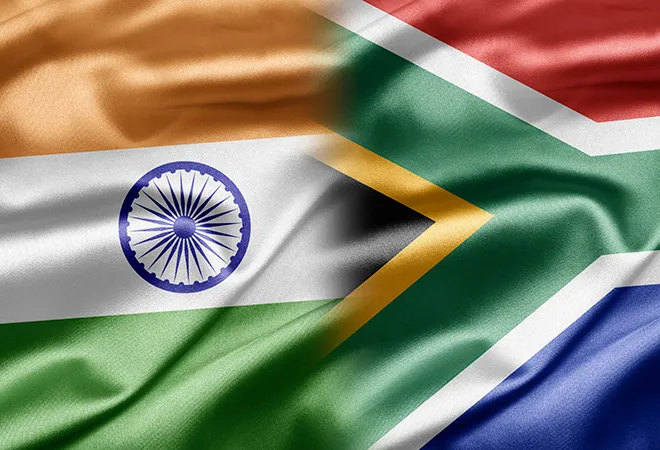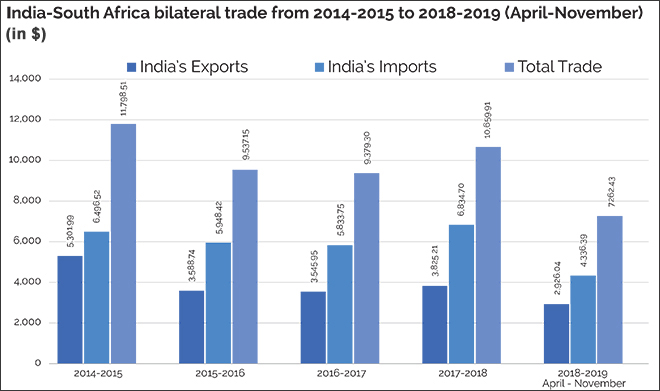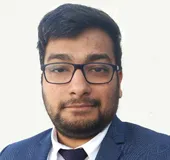
India’s relationship with South Africa is both fundamental and unique, dating back several centuries and is anchored in common ideals, ideas, interests, and icons – like Mahatma Gandhi and Nelson Mandela. However, their bilateral relationship remained strained for a long time due to South Africa’s apartheid government. Following its independence, India intensified its struggle at multilateral organisations like United Nations (UN), Commonwealth, and Non Aligned Movement (NAM), and was the first country to severe trade relations in 1946, and subsequently imposed political and economic sanctions. After a gap of four decades, India re-established trade and business ties in 1993, after South Africa ended its institutionalised racial segregation. In May 1993, a Cultural Center was opened in Johannesburg. In November 1993, diplomatic and consular relations were restored during the visit of then South African Foreign Minister Pik Botha to India. The Indian High Commission in Pretoria was opened in May 1994. In 1996, India opened its permanent Office of High Commission in Cape Town, which was re-designated as Consulate General of India in 2011.
India and South Africa’s shared common experiences and collective strength have shaped how they both view the world together. As two nations who have shared their struggle to freedom, the responsibility to improve the lives of others is embedded within India and South Africa’s consciousness. After South Africa achieved democracy in 1994, it was the Red Fort Declaration on Strategic Partnership between India and South Africa, signed in March 1997 by then PM Shri Deve Gowda and Nelson Mandela, which set the parameters for a rekindled relationship. The 20th anniversary of signing of the declaration was commemorated by an India-South African cultural extravaganza comprising of music and dance performances, and an event organised by High Commission of India, Pretoria on April 9, 2017. This Strategic Partnership between the two countries was again re-affirmed in the Tshwane Declaration (October 2006). Both these declarations have been instrumental mechanisms that has contributed in the past to both South Africa and India for achieving their respective national objectives.
Bilateral trade and investments – India is South Africa’s fifth-largest export destination, and fourth-largest import origin and is the second-largest trading partner in Asia. Both countries are working to boost trade volumes in the coming years. Bilateral trade between India and South Africa currently stands at $10 billion. In 2016, both countries set a target of doubling bilateral trade and investment to $20 billion by 2021.
India-South Africa bilateral trade from 2014-2015 to 2018-2019 (April-November)
 Source: Export Import Data Bank, Department of Commerce, Government of India, New Delhi. Accessed on 21 January, 2019 from http://commerce-app.gov.in/eidb/
Source: Export Import Data Bank, Department of Commerce, Government of India, New Delhi. Accessed on 21 January, 2019 from http://commerce-app.gov.in/eidb/
A recent joint study by Confederation of Indian Industries (CII) and Price Waterhouse Cooper (PwC) published in May, 2018, suggested that around 140 Indian companies have invested close to $4 billion in South Africa, thereby creating direct employment for over 18,000 people. The leading Indian companies are Wipro, Coal India, Cipla, HCL Technologies, Tata Motors, Zomato, Mahindra and Mahindra, Vedanta, and Motherson Sumi. South African companies which have invested in India are SASOL, FirstRand, Old Mutual, ACSA, Shoprite and Nandos.
Indian community in South Africa – South Africa is home to the highest number of Indian Diaspora in the African continent, with a total strength of 1,218,000 thereby constituting 3 percent of South Africa’s total population. Since 2003 onwards, India celebrates Pravasi Bhartiya Divas (PBD) each year on 9th January (the day Mahatma Gandhi returned from South Africa to India). Various mini-PBDs are also held regionally. The fourth in the series called ‘PBD-Africa’ was held in Durban, South Africa, on October 2010. This event also marked the 150th anniversary of the arrival of Indian in South Africa. One of the event’s activities is Pravasi Bharatiya Samman Award (PBSA), which is the highest honor conferred on overseas Indians, including in Africa. Some of the awards winners from South Africa are Prof Fatima Meer (2003), Ahmed Kathrada (2005), Sisupal Rambharos (2006), Billy Nair (2007), Ms Khorshed Noshir Ginwala (2012), Ismail E. Ebrahim (2013), Ms Ela Gandhi (2014), Essop Goolam Pahad (2015), Swami Sardaprabhananda and Anil Sooklal (2019).
High-level visits - Both the countries have maintained their unique bilateral relationship marked by regular high-level visits and exchanges.
| Country |
High-level visits |
Ministerial visits |
Joint Commission and Foreign Office Consultations |
Parliamentary visits |
| India |
Shri Narendra Modi 7-9 July, 2016
Former PM Dr. Manmohan Singh in March 2013 attended 5th BRICS Summit held in Durban
On passing away of Nelson Mandela, former President Shri Pranab Mukherjee led a multi-party delegation on December 5, 2013
Former President Smt. Pratibha Patil paid a State visit to South Africa in May 2012 |
Sushma Swaraj visited South Africa for the 9th session of the India-South Africa Joint Ministerial Commission (JMC) on May 19, 2015.
Gen. Dr. V.K.Singh (Retd) visit from 16-18 October 2017 to attend IORA 17th Meeting of the Council of Ministers and the 8th IBSA Trilateral Ministerial Commission in Durban on 17 October, 2017.
Sushma Swaraj visited South Africa on a five-day tour to participate in the second BRICS Foreign Ministers meeting on June 4, and the 8th Trilateral Ministerial Commission meeting on June 5, 2018. |
Set up in 1994, the India-South Africa Joint Commission at the level of Foreign Ministers to identify areas of mutually-beneficial cooperation.
9th session of India-South Africa Foreign Office Consultation in New Delhi on 18 January, 2018
8th session of JMC hosted by India in March 2011 |
A goodwill parliamentary delegation led by then Minister for Parliamentary Affairs and Water Resources Shri. Pawan Bansal visited South Africa in October, 2012. |
| South Africa |
In October 2016, former President Jacob Zuma attended the BRICS summit in Goa and had also earlier attended the 4th BRICS summit in March 2012.
Jacob Zuma led a South African delegation to India for the 3rd India-Africa Forum Summit in 2015
Former President Jacob Zuma paid a State visit in June 2010 accompanied by 200 member strong business delegation and senior officials. |
Ms Maite Nkoana-Mashabane visited Gandhinagar, India on 7-9 January 2015 to attend Pravasi Bhartiya Divas 2015 as the Guest of Honour.
On the sidelines, Ms Maite Nkoana-Mashabane called on PM Narendra Modi and met EAM Smt. Sushma Swaraj.
Mr. Malusi Gigaba, then Home Minister of South Africa visited India from 5-9 July, 2015 and met with Home Minister Shri Rajnath Singh. |
8th session of India-South Africa Foreign Office Consultations was held in Pretoria in May 2016.
9th session of JMC on 19 May, 2015 in Durban.
7th session of JMC in February 2008, in Pretoria. |
A joint parliamentary delegation led by Speaker Mr. Max Sisulu, and Chairperson, National Council of Provinces, Mr. M.J. Mahlangu visited India in July 2012. |
Source: “India-South Africa Relations”, Ministry of External Affairs, Government of India, New Delhi. December, 2017. Accessed on 21 January, 2019.
PM Modi’s 2016 visit - During PM Modi’s visit to South Africa on July 8, 2016, a number of MoU/Agreements were signed such as; Memorandum of Understanding on ICT, Programme of Cooperation in Arts and Culture, Memorandum of Understanding on Tourism, and Memorandum of Understanding on the Establishment Grass Root Innovation in the area of Science and Technology.
In the joint statement which was released subsequently, both PM Narendra Modi and then President of South Africa Mr. Jacob Zuma referred to the historical relations which India and South Africa shares, as well as the mutual struggle against colonialism and oppression. Both leaders agreed to collaborate in defence sector, especially in terms of the opportunities available for South African private sector under ‘Make in India’ initiative, energy sector, agro-processing, human resource development, and infrastructure development. Also, the relaxation of foreign direct investment (FDI) rule through the lifting of the caps on FDI in nine sectors of the Indian economy, including defence, food retail, local airlines, private security firms and pharmaceutical sectors, has been well-appreciated by the South African government. President Zuma and PM Modi also welcomed the decision of the Confederation of Indian Industries (CII) to open a regional office in Johannesburg. In the field of scientific and technical (S&T) research, the Department of Science and Technology of both countries have collaborated, especially in the Square Kilometer Array (SKA) project under which eight new bilateral Research and Development (R&D) projects for capacity building and instrumentation development in the area of astronomy were to be implemented under the framework of India-South Africa S&T Cooperation.
List of MoUs signed during 10th BRICS Summit – The MoUs signed between India and South Africa on July 26, 2018 were;
- Memorandum of Understanding between the Indian Council of Agricultural Research, New Delhi, India and the Agricultural Research Council, Pretoria, South Africa on Cooperation on Agricultural Research and Education
- Memorandum of Understanding between Government of Republic of South Africa and Government of India regarding the Setting up of the “Gandhi Mandela Centre of Specialisation in Artisan Skills” in South Africa
- Memorandum of Understanding between Indian Space Research Organisation and the South African National Space Agency on Cooperation in the Exploration and uses of Outer Space for Peaceful Purposes
Partnership in multilateral fora’s - India and South Africa have a long history of working together by coordinating their views and efforts in institutions of global governance/multilateral fora’s, in order to achieve greater autonomy and ensure that the agenda of ‘South’ is prioritised.
BRICS (Brazil, Russia, India, China and South Africa) – In 2010, the formerly known grouping of BRIC, became BRICS with the induction of South Africa. The BRICS Forum’s valuable contribution in reforming the global financial and economic architecture is well-appreciated by both India and South Africa. During the sixth BRICS summit in Fortaleza in 2014, a decision was taken to establish the New Development Bank (NDB) which aims to mobilise resources for development project in BRICS, emerging economies, and developing countries. BRICS leadership in creating alternative institutions like the NDB is indeed noteworthy. Although the NDB is not envisaged as rivals to the International Monetary Fund and World Bank, as an additional mechanism, the political message is clear. Both India and South Africa remains committed to work together to enhance intra-BRICS trade, investment, and financial cooperation.
IBSA (India, Brazil, and South Africa) – Established in 2003, the IBSA Dialogue Forum brings together three large democracies and major economies from three different continent’s facing similar developmental challenges, and represents three developing, pluralistic, multicultural, multiethnic, multilingual, and multi-religious nations. India and South Africa appreciates the work carried out by the IBSA Facility for Poverty and Hunger Alleviation (IBSA Fund), established in March 2004, and became operational in 2006, in sharing experiences, expertise, and capacities with developing countries in a South-South Cooperation framework.
G20 – Both India and South Africa recognises G20 as the premier forum for coordination in international financial and economic matters, and calls upon the world-community to utilise monetary, fiscal, and structural reforms to jump-start the global economy. During his meeting with former President Zuma in 2016, PM Modi agreed on India’s continued support for the South African proposals on the illicit financial flows, the Antimicrobial Resistance (AMR) and for the industrialization of Africa and Least Developed Countries (LDCs) as well as the G20 Action Plan on the implementation of the 2030 Sustainable Development Agenda.
World Trade Organisation (WTO) – India and South Africa supports WTO as the sole-multilateral mechanism on global trade, commerce, and in the centrality accorded to the development-agenda in the Doha Development Round. On July 12, 2018, India and South Africa made a joint proposal at the WTO, which said “the realities prevailing in the 1998, when WTO members agreed for the first time to the temporary moratorium on customs duties on electronic transmissions, have changed significantly during the subsequent two decades.” Their main contention is that the present moratorium can lead to loss of competitiveness among developing countries, since they have higher tariffs on physical products, while the same product in digital form attracts zero duty. This joint India-South Africa report took due note of attempts by the developed world to make commitments more comprehensive and stringent through negotiations on regional trade agreements and multilateral agreements.
President Ramaphosa’s up-coming visit – Chief Guests visit to Indian Republic Day parades is full of symbolism and the guest is decided on the basis of other countries’ interest and the guest’s availability. The growing synergy in India-South Africa bilateral ties is underscored by the fact that, this year’s Chief Guest of Honour is President of Republic of South Africa H.E Cyril Ramaphosa. The invitation was extended and accepted by President Ramaphosa during his meeting with PM Modi on the margins of G20 Summit in Buenos Aires, Argentina in 2018. This year is significant as it marks the 150th anniversary of Mahatma Gandhi and the 100th anniversary of Nelson Mandela. The visit will be President Ramaphosa’s first visit to India as Head of State, and will be the second South African President to be the Chief Guest for India’s Republic Day parade, after Nelson Mandela in 1995. Mr. Ramaphosa will be accompanied by First Lady Dr. Tshepo Motsepe and a high-level delegation including nine ministers, senior officials, and fifty-member business delegation.
During the visit, President Ramaphosa and PM Modi will address the India-South Africa Business Summit (ISABS) whose objective is to grow business ties between the two countries. The first ISABS was held on April 30, 2018 at Sandton Convention Center, Johannesburg. Both PM Modi and President Ramaphosa has identified skill development, health services and digitisation of governance as priority sectors.
Since 1993, over 1200 South Africans have received skills and technical training in India under Indian Technical and Economic Cooperation Programme (ITEC). In this regard, the Pretoria Institute, which is set to be inaugurated in the first quarter of 2019, will provide electrical, mechanical fitting, boiler-making, and millwright skills training. The visit offers a golden opportunity for employed South Africans aged 25 to 45 to apply for this Indian training programme.
President Ramaphosa’s visit will also provide an opportunity to discuss India-South Africa bilateral defences ties. In the past, Denel, a South African local manufacturer of defence products and solutions, has been a major arms exporter to India. However, the company was blacklisted in 2005 by then UPA government over paying kickback allegations. After a hiatus of thirteen years, the ban was lifted following a May, 2018 judgement of the Supreme Court which dropped all corruption charges. Under India’s ‘Make in India’ programme, Denel will explore opportunities for joint ventures with Indian firms.
India-South Africa partnership is progressive and forward looking. Our rich culture and people-to-people contacts lends character and quality to India-South Africa ties. The visit of President Ramaphosa as Chief Guest of Honour for India’s Republic Day parade is a step in the right direction for consolidating our bilateral ties.
The views expressed above belong to the author(s). ORF research and analyses now available on Telegram! Click here to access our curated content — blogs, longforms and interviews.




 Source: Export Import Data Bank, Department of Commerce, Government of India, New Delhi. Accessed on 21 January, 2019 from http://commerce-app.gov.in/eidb/
Source: Export Import Data Bank, Department of Commerce, Government of India, New Delhi. Accessed on 21 January, 2019 from http://commerce-app.gov.in/eidb/ PREV
PREV


